MySQL Configuration Settings
Update your MySQL parameter configurations in a few simple clicks through the ScaleGrid console admin settings for your MySQL deployments.
The MySQL server has many operating parameters, which can be set through configuration file or option file (/etc/my.cnf). It is also possible to change many parameters at runtime. ScaleGrid console offers a simple user interface (UI) to configure some of the important parameters for your MySQL deployments.
Finding Your MySQL Configuration Settings
Here are the steps to access your MySQL configuration settings:
- Log into the ScaleGrid console.
- Go to your MySQL page, then click into your MySQL cluster you wish to configure.
- Select the Admin tab at the top.
- Click on the Configuration menu option on the left.

As shown above, MySQL configuration parameter names, their current values, and a brief description about each parameter is presented in a tabular format in your admin configurations.
Non-editable field valuesThe value field for some of the parameters are grayed out to indicate that these are not editable parameters for the deployment.
Updating Your MySQL Parameters
There is a search bar at the top as highlighted below for the easy access of the parameter that you would like to change.
For example, the screenshot below shows the parameter ‘sql_mode’ that can take a combination of many values and can be selected from a drop down list. Once selections are made, click on the green Save button to set this configuration for your MySQL deployment.
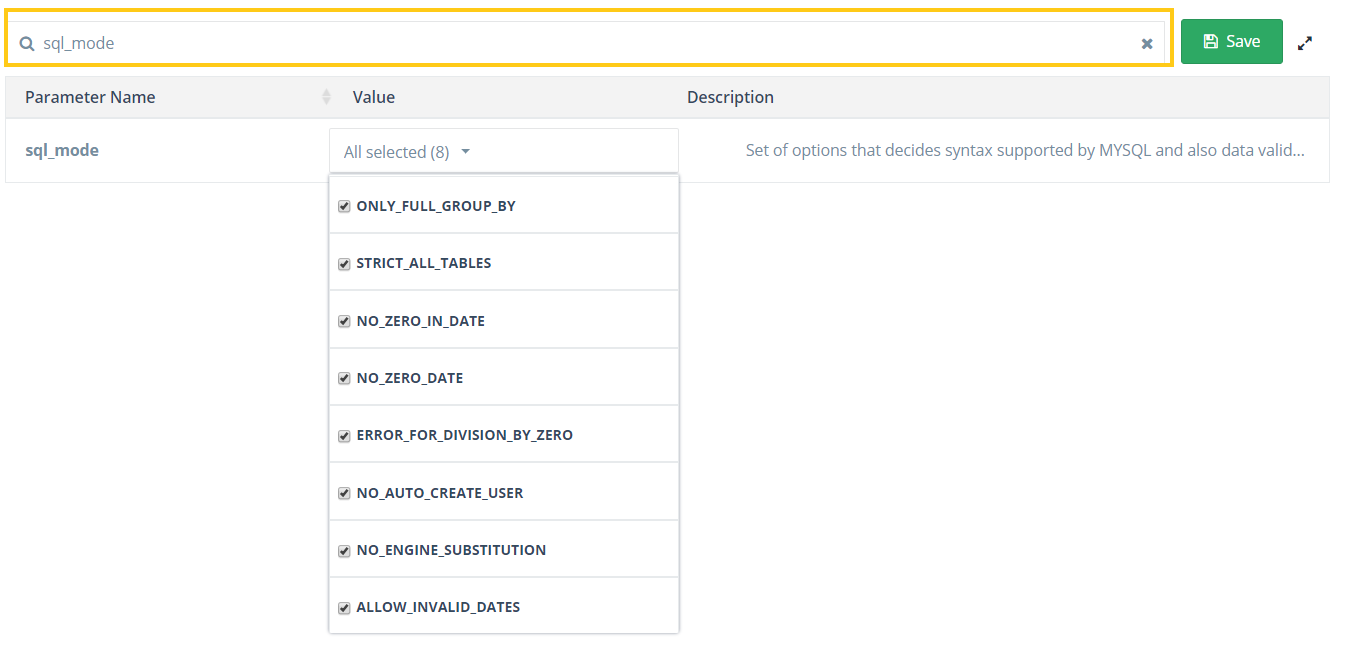
After clicking the Save button, you will see a Confirmation Dialog showing a summary of changes you have made as below.
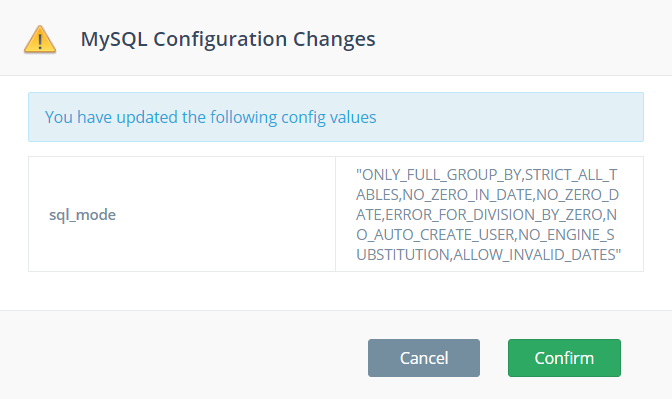
After clicking the green Confirm button, the configuration will be applied to your deployment through an ‘Update Configuration’ job that can be monitored from the Jobs tab.
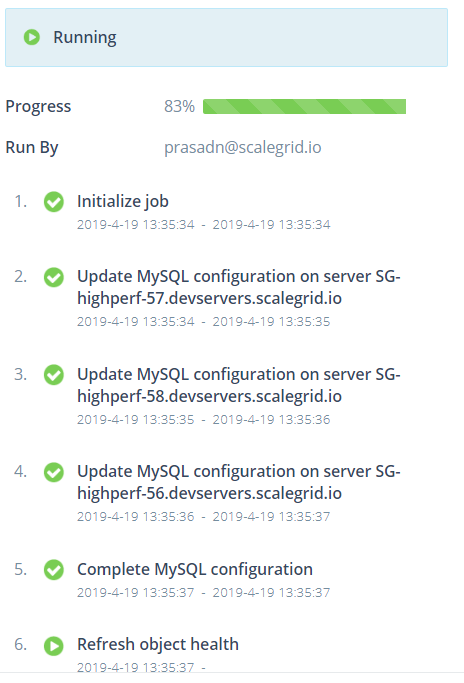
Updating MySQL Configuration Parameters That Need a Server Restart
Some of the configuration settings in MySQL take effect only if the server is restarted. One such parameter is ‘innodb_log_file_size’. If you set this parameter and click on the Save button - the Confirmation dialog will show a Warning message that the config value will require a MySQL restart.
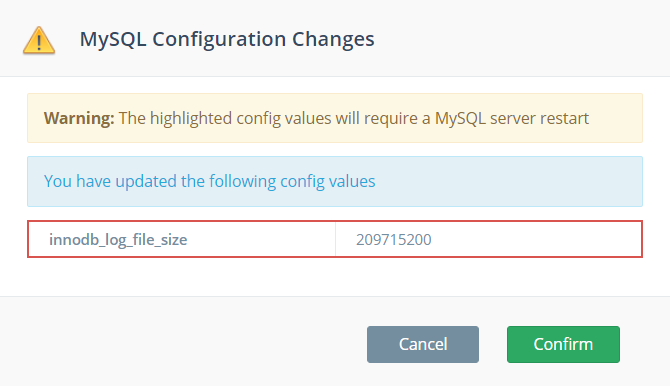
If you Confirm, then the configuration is applied on your MySQL deployment in a rolling fashion one server at a time and the server is restarted.
For instance, in a 3-node master-slave setup, the configuration is first applied on the slave nodes and then they are restarted. The Master is stepped down and one of the Slaves is promoted as a new Master. The configuration will then be applied on the old Master. The whole operation is done with minimal down time.
This rolling job can be monitored from the Jobs tab as below:
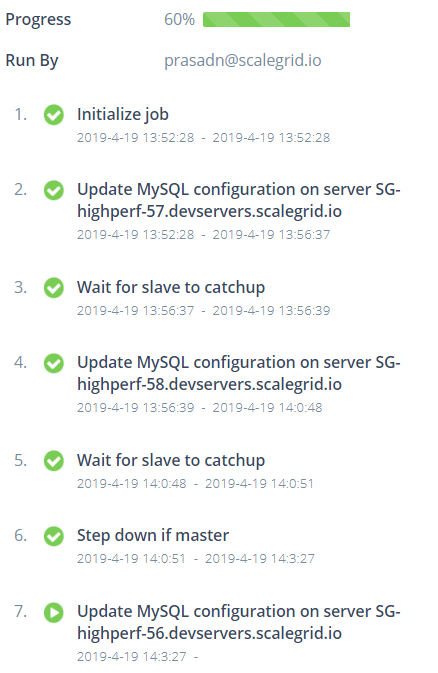
MySQL Parameter Names and Descriptions
Check out the list of MySQL parameters available to review and configure at ScaleGrid:
Parameter | Description | Editable |
|---|---|---|
port | MySQL server port | No |
skip_name_resolve | Disable DNS name resolution | No |
user | User account that runs mysql service. | No |
pid_file | PID file | No |
socket | Socket file | No |
require_secure_transport | Server mandates secure connections. | No |
ssl | Enable SSL on the server. | No |
log_bin | Basename with path of binary log files. | No |
expire_logs_days | Number of days for automatic binary log file removal. | Yes |
sync_binlog | Number of binary log commit groups to collect before synchronizing the binary log to disk. | No |
binlog_group_commit_sync_delay | Number of microseconds the binary log commit waits before synchronizing the binary log file to disk. | Yes |
max_connect_errors | Max number of connection errors from a host before these server blocks it from further connections. | Yes |
max_allowed_packet | Maximum size of a packet (Bytes) that the server can send and receive. | Yes |
max_heap_table_size | Maximum size to which user-created MEMORY tables are permitted to grow. | No |
max_connections | Maximum permitted number of simultaneous client connections. | Yes |
max_user_connections | Maximum permitted number of simultaneous client connections. | No |
thread_cache_size | Number of threads the server should cache for reuse. | Yes |
open_files_limit | Number of file descriptors available to mysqld. | Yes |
table_open_cache | Number of open tables for all threads. | No |
table_definition_cache | Number of table definitions that can be stored in definition cache. | No |
relay_log | Basename with path of relay log files. | No |
gtid_mode | Enable GTID based logging | No |
enforce_gtid_consistency | Server allows execution of only statements that can be safely logged using a GTID. | No |
binlog_format | Binary log format | No |
log_slave_updates | Controls whether updates received by a slave server from a master server should be logged to the slave's own binary log. | No |
slave_net_timeout | Number of seconds to wait for more data from a master/slave connection before aborting the read. | Yes |
master_info_repository | To determine whether master info is maintained in a file or table. | No |
relay_log_info_repository | To determine whether the relay logs are maintained as a file or table. | No |
sync_master_info | Number of events after which slave updates the IO thread position in its master info repository table. | No |
sync_relay_log | Number of events to relay log after which slave flushes the relay logs to disk. | No |
relay_log_recovery | Enable automatic relay log recovery immediately following server startup. | No |
slave_parallel_workers | Number of slave applier threads for executing replication transactions in parallel. | Yes |
slave_preserve_commit_order | Ensure transaction commit happens in the same order as they appear in slave relay log. | No |
slave_parallel_type | Policy to decide parallel transaction execution. | No |
rpl_semi_sync_master_timeout | Time in milliseconds after which master switches to async mode of replication if it has not received back from slave. | Yes |
rpl_semi_sync_master_wait_for_slave_count | The number of slave acknowledgments the master must receive per transaction before proceeding. | No |
rpl_semi_sync_master_wait_no_slave | Controls whether the master waits for the timeout period configured by rpl_semi_sync_master_timeout to expire, even if the slave count drops to less than the number of slaves configured by rpl_semi_sync_master_wait_for_slave_count during the timeout period. | No |
relay_log_space_limit | An upper limit on the total size (in bytes) of all relay logs on the slave. A value of 0 means "no limit". | Yes |
max_relay_log_size | Maximum size (in bytes) of a slave relay log after which it rotates. Value of 0 means this size will be same as max_binlog_size. | Yes |
max_binlog_size | Maximum size (in bytes) of a binary log after which it rotates. | Yes |
datadir | The path to the MySQL server data directory. | No |
general_log | Enable General log | No |
general_log_file | General Log File | No |
log_error | Error log file | No |
default_storage_engine | Storage Engine for MySQL | No |
innodb_log_files_in_group | Number of log files in the log_group. | No |
innodb_flush_log_at_trx_commit | Frequency of transactions at which InnoDB log buffer is written to the log and flushed to disk. | No |
innodb_flush_method | Method used to flush data to InnoDB data and log files. | No |
innodb_file_per_table | Determines whether each newly created table will have its data and index as part of separate ibd file. | No |
innodb_log_file_size | Defines the size (in bytes) of each log file in a log_group. | Yes |
innodb_buffer_pool_size | Size (in bytes) of memory used by InnoDB to cache table and index data. | Yes |
innodb_io_capacity | Upper limit on the number of I/O operations performed per second by InnoDB background tasks. | Yes |
innodb_adaptive_hash_index | Indicates whether InnoDB adaptive hash indexes are enabled or disabled. | Yes |
innodb_lock_wait_timeout | Length of time in seconds an InnoDB transaction waits for a row lock before giving up. | Yes |
log_queries_not_using_indexes | Logs queries that are expected to retrieve all rows to slow query log. | Yes |
log_slow_admin_statements | Include slow administrative statements in the statements written to the slow query log. | Yes |
log_throttle_queries_not_using_indexes | Variable to limit the number of slow queries per minute that can be written to the slow query log. | Yes |
long_query_time | If a query takes longer than this many seconds, it is considered as a slow query. | Yes |
slow_query_log | Generate slow query log files | No |
slow_query_log_file | Name of the slow query log file | No |
symbolic_links | Enable symbolic link support | No |
interactive_timeout | Number of seconds the server waits for activity on an interactive connection before closing it. | Yes |
div_precision_increment | Number of seconds the server waits for activity on an interactive connection before closing it. | Yes |
sql_mode | Set of options that decides syntax supported by MySQL and also data validation checks it performs. | Yes |
event_scheduler | State of the Event Scheduler | Yes |
Updated 9 months ago
